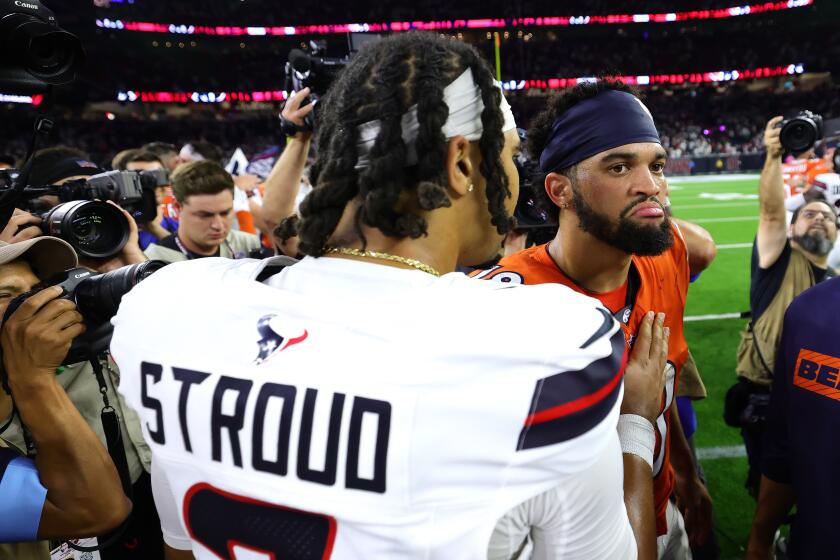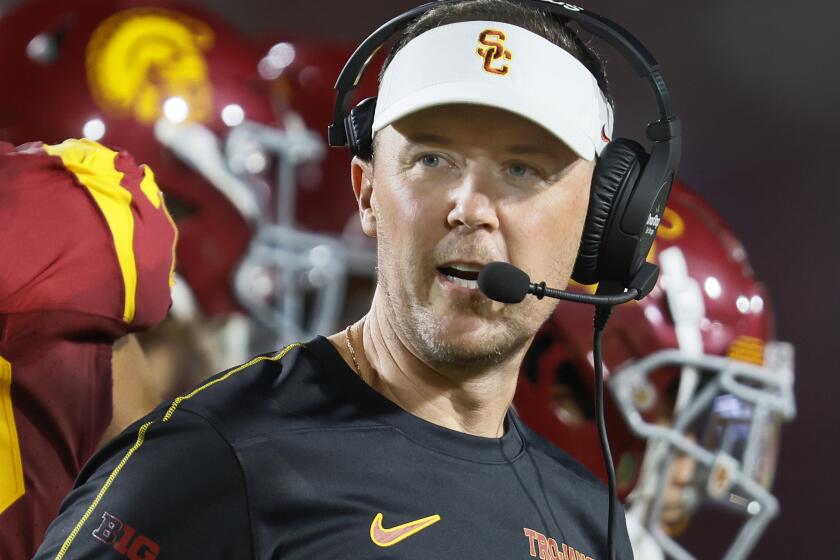Still on Defense
Sitting in a hotel bar near midnight, the man tells his stories and it might be easy to dismiss him as an eccentric. A free spirit. Maybe even a lunatic.
Listen to Riki Ellison talk about his college days at USC, jumping off buildings and getting run over by cars.
“I was a wild kid,” he says.
Or ask the guys who played football with him in college and for a decade in the NFL.
“You look in those eyes and think, man, there’s something going on in that guy’s head,” former USC quarterback Paul McDonald says. “I’m not sure I want to go there.”
But then comes the part where the 44-year-old Ellison talks about his life now. Crisscrossing the nation during election season to appear beside senators and local party officials. Meeting with campaign representatives for President Bush and Sen. John F. Kerry.
This is not an easy guy to pin a label on, never has been.
*
The freshman linebacker who arrived at USC in 1978 was nothing if not determined. He took one look at those song girls in their white sweaters and said: “I’m going to marry one of them.”
A particular young woman caught his eye. Though they hardly knew each other, he drew a heart on the door of her dorm room with the words: “Sheila, I Love You, Riki.”
He wrote it in blood.
*
No surprise that Ellison is a puzzle. Born in New Zealand with direct lineage to the native Maori tribe. Father a professor, mother with a doctorate in modern dance. Not the makings of your typical football player.
His parents split up when he was young and his mother brought him to Pasadena, then to an Arizona ranch. At each stop, Ellison struggled to fit in.
Football helped solve that problem. At USC, Riki Gray -- he took his stepfather’s surname -- started as a freshman and won over the song girl and it was pretty much a dream come true. Except that in his first season, in the Rose Bowl no less, his knee blew out.
The next two seasons saw dazzling play interrupted by more injury, one surgery after another. Finally, Coach John Robinson told him to take a break.
A trip to Fiji reunited him with his birth father and Maori heritage. “I must have seen the movie ‘Roots,’ ” he says. He switched back to his original name.
Also, when Ellison returned to USC, he took greater interest in school. As a former fraternity brother, George Furla, says: “When he gets focused on something, forget about it.”
The transformation began almost on a whim, with an elective class in international relations. Ellison recalls: “A bunch of Middle Eastern guys and a bunch of pro-Israel guys. Arguments. Very animated.”
He was hooked. Then came classes with William Van Cleave, who had been part of the U.S. delegation to the Strategic Arms Limitation talks. Then came a 1983 speech in which President Reagan spoke about the Strategic Defense Initiative, or “Star Wars” project.
Laser beams and nuclear-powered reactors orbiting in space, designed to pick off enemy missiles in mid-flight. Exactly the sort of thing that made sense to a linebacker.
*
Not long after Ellison made it to the NFL, he and teammate Tom Holmoe decided to watch Fourth of July fireworks from a small boat in a lagoon near their homes. Ellison brought a bag full of powerful M-80 firecrackers, but it was too blustery to light them.
So he struck a match inside the bag, which caught fire. Holmoe dived into the lagoon.
“Heck yeah, I didn’t want to get killed,” Holmoe says. “The bag was on fire and he was trying to put it out with his hands.”
*
Though Ellison played in his senior year at USC, he seemed more destined for national defense than the defensive front seven. The Dallas Cowboys flew him in and he flunked their physical, a team executive saying: “You probably will not be playing in the NFL.”
The San Francisco 49ers gave him a tryout too, and a shirt. Ellison figured it was only because his former USC teammate, 49er safety Ronnie Lott, had put them up to it.
On the day of the 1983 NFL draft, he was at a friend’s house.
“I saw my name come up on the television screen,” he says. “I couldn’t believe it.”
The 49ers drafted him in the fifth round and he wore that shirt all week. Still, his knee kept swelling at training camp, forcing him to miss practice. Each morning, he rose early to check the cut list, expecting to see his name. By opening day, he was a starting linebacker.
“I don’t know what it is ... something in his psyche,” says Holmoe, who played defensive back on the team. “He has so much passion.”
Seven years with the 49ers. Three Super Bowl rings and more stories. Lots of stories.
His teammates called him “Fruit Loops,” but this was also a guy who read the Foreign Affairs journal at lunch and spent his off-seasons working as a consultant for Lockheed.
The combination of ferocity and smarts made him a leading tackler on the 49ers, kept him playing through broken arms in 1987 and ’89. The Los Angeles Raiders signed him as a free agent in 1990.
*
Shortly before a playoff game against the Cincinnati Bengals in 1991, Ellison was stuck in traffic near the Coliseum and in danger of missing warmups. He called to the passenger in the car beside him.
Would the guy be willing to drive Ellison’s Porsche 944 to the stadium?
Ellison tossed him the keys and took off on foot. His Raider teammates told him: “Forget it, your car’s in Tijuana.”
After the game, the fan was waiting outside the stadium tunnel, keys in hand.
*
When football ended for him in 1992, Ellison decided to make a clean break, moving his family to New Zealand. It did not work out so well.
He attempted to establish a postseason football game in Auckland, the Haka Bowl, but he couldn’t come up with financial guarantees. His stepbrother died of cancer. Sheila, the song girl turned author, not only left with their four children but wrote a book about coping with divorce.
“It humbled me,” Ellison says.
Back in the U.S., he coached high school football for two seasons but it was not his true passion.
Then, in 2001, the Bush administration announced its intention to withdraw from the 1972 Antiballistic Missile Treaty, opening the door for missile defense systems, and Ellison was set in motion.
He founded the Missile Defense Advocacy Alliance, a nonprofit coalition that promotes missile defense and measures public opinion.
The issue is highly controversial. The nation’s first interceptor missile was installed in Alaska in June with plans to deploy 20 more, including several at Vandenberg Air Force Base, by next year. Bush has called missile defense “necessary to protect us against the threats of the 21st century.”
But critics say the technology is better suited to the Cold War than to an era when terrorists are more likely to deliver a nuclear weapon in a suitcase or shipping container. They claim that current systems have not been adequately tested.
Kerry has voiced support for missile defense in theory, but has said he places greater priority on adding troops and improving intelligence-gathering.
The Missile Defense Advocacy Alliance claims that 80% of Americans support deployment of missile defense systems. Political opponents question that number.
“I think [Ellison] biases his case,” says John David Isaacs, president of the Council for a Livable World, an arms control organization. “He manipulates his polls to show what he wants them to show.”
Still, Isaacs calls Ellison a credible and articulate voice in the debate. Politicians who want information on the issue now turn to him, which has kept him traveling in the weeks leading up to the election.
“This cuts across political lines,” Ellison says. “I give these numbers to congressmen, senators, local party officials on both sides
*
The pregame scene before University of Washington football games is routinely genteel. The stadium sits at water’s edge and fans host tailgate parties on sailboats and motor cruisers.
Last season, Ellison called upon a friend in Seattle who owned a boat. They outfitted it with USC flags and cranked up the stereo.
“We circled the area for two hours playing the USC fight song,” he says. “Loud.”
*
Ellison traveled to Provo earlier this season for reasons that had nothing to do with politics. After all these years, he remains a rabid USC fan and this passion has spawned another, less-publicized group.
Born out of the 1990s, when the USC football team struggled, the Templar Knights of Troy -- there are about 10 members -- seek to prove their devotion in unusual ways.
Admittance to the group requires three so-called acts of bravado. Candidates must “acquire” a copy of the Iliad, in Greek, from one of the schools on USC’s football schedule. Also a personal item from an opposing player, coach, mascot or cheerleader.
The third act is voted on by members. For Ellison, it involved slipping inside a Notre Dame fan’s recreational vehicle before a USC game, then going for a joy ride.
The Templar Knights convene primarily at road games where they sit among opposing fans, sometimes wearing red berets, always waving large USC banners.
Such behavior occasionally sparks heated debates. Just the thing for a linebacker turned political activist. An eccentric. Whatever you want to call him.
“We separate the men from the boys,” Ellison says. “The true believers.”
Go beyond the scoreboard
Get the latest on L.A.'s teams in the daily Sports Report newsletter.
You may occasionally receive promotional content from the Los Angeles Times.




